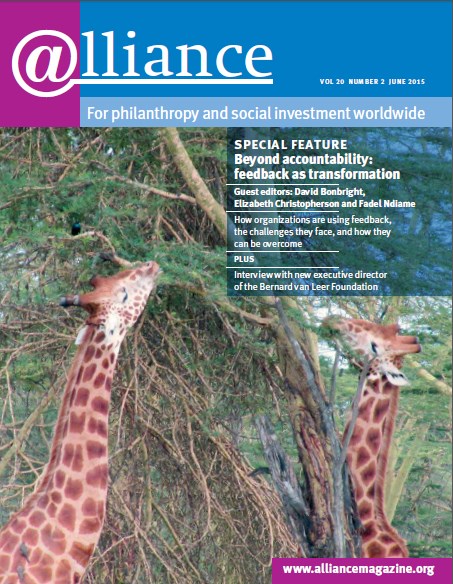Philanthropy advice is a niche but growing service, increasingly offered by a wide variety of different and competing actors – independent advisers, family offices, banks, law firms, notary firms and wealth managers. Under these circumstances, concern with increased competition is understandable from a market share perspective. However, from the standpoint of market growth, and if we wish to unlock the full potential of strategic philanthropy, these different actors should start seeing each other as partners rather than competitors.
Banks offering philanthropy services to ultra high net worth clients is a quite recent phenomenon, certainly in continental Europe. Initially, these services were fairly strictly related to the core activities of banks – tax, financial and legal advice. More recently, new services have been introduced as donors increasingly wish to ensure that funds devoted to philanthropy achieve the maximum impact. But is the internalization of a full range of philanthropy advice services within banks an optimal solution?
For banks, bringing philanthropy advice services in house is a strategic choice to provide customers with more holistic support for the management of their wealth. It also enables them to forge stronger relationships with their clients, particularly as it mobilizes emotions and common human values. Banks ensure privacy, minimize reputational risks, and provide highly qualified and technical expertise in terms of administrative options. However, their services are coming up against demands they struggle to meet.
The shift to strategic, high-impact philanthropy means that today’s donors are becoming aware of the need to achieve defined objectives, invest themselves personally and co-create strategies and action plans with NGOs, rather than just writing a cheque. In general, donors want to be more closely involved with their implementing partners and their beneficiaries; they want a better understanding of the projects they support, and guarantees that solid processes of monitoring, evaluation and impact measurement are in place with a view to maximizing the impact of their funds.‘Donors want to be more closely involved with their implementing partners and their beneficiaries.’
In addition, the speed of modern information flows and demand for transparency have revealed a number of challenges to the success of philanthropic projects. Problems in the project’s management can jeopardize the achievement of the donor’s objectives, and they are also a potential reputational risk for both the philanthropist and the bank. To mitigate these risks, a deep understanding of the humanitarian and development environment and knowledge of project cycle management are needed.

Field mission in Mozambique in 2007 after floods – Eric Berseth is standing at the front of the boat.
Banks therefore find themselves needing to enlarge and diversify the scope of their services as well as the skills and competencies within their teams, and they might be reluctant to face the increased costs and the structural and strategic development that this implies.
Independent advisers have emerged precisely in response to donors’ demand for more beneficiary- and impact-oriented services. Some independent consultants are experts in development and humanitarian aid, which is quite distant from more traditional forms of financial investment, and have built their credibility on the success of the projects supported. Thanks to their wide networks and high levels of field expertise, they can provide the technical and qualitative support the new generation of philanthropists expects to receive.
Philanthropy advice services provided by banks and independent consultants both have their place. Both can be effective in meeting donors’ growing needs and aspirations. But they can and should be seen as complementary rather than competing. Banks, while providing high-quality legal and financial expertise, should rely on independent consultants to monitor projects and assess their impact; to determine the needs of both the philanthropists and the beneficiaries; and to have a better understanding of the country and regional contexts where the projects operate. From the other side, philanthropy advisers should not be afraid to outsource services requiring expertise on legal, tax-related and financial mechanisms. Only by constructively accepting each other’s limitations and complementing each other’s services can we hope to maximize the potential of strategic philanthropy.
Eric Berseth is executive director and managing partner of Philanthropy Advisors. Email eberseth@philanthropyadvisors.org







Comments (1)
It is interesting that banks in continental Europe are only now getting into the business of philanthropic advising. There is a long history of banks in the USA advising and managing the funds of high net worth individuals, going back at least to the early 20th century. One of the chief functions of trust banks was setting up and managing charitable trusts. Frederick Harris Goff, while president of the Cleveland Trust Company, conceived and established the first community foundation in the US in trust form. Community foundations in trust form combine the multiple charitable trusts established by individuals that are managed as one large trust by the bank. Goff also was involved in setting up and served as trustee for several large estates in Cleveland that were not part of the community foundation. In the early 20th trust banks and lawyers were in competition for advising HNW individuals, although as the century progressed and charity law became more developed and complex, they came to see their roles as complementary.